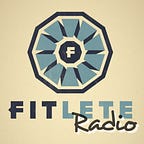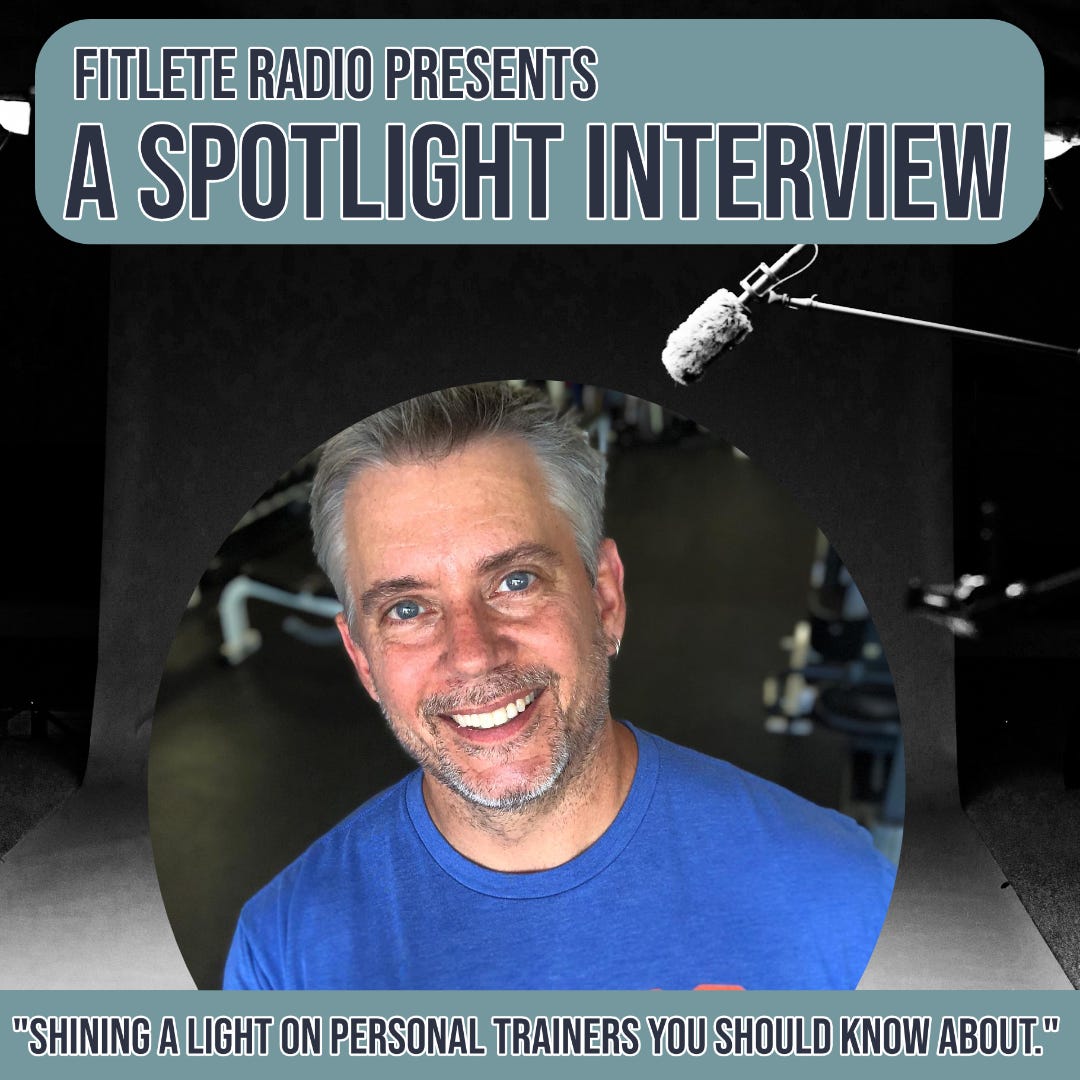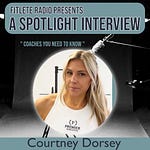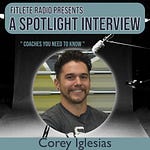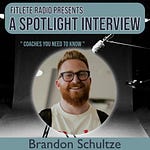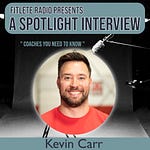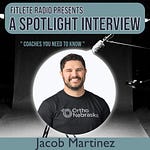We get to know Chad Landers in this Trainer Spotlight episode of FITLETE Radio.
GEORGE: Introduce yourself and tell us a little about what you do and your background.
Hey, I'm Chad Landers. I have a Bachelor of Science in Kinesiology from the University of Illinois. I was also the first American, and at the time only American, to get a postgraduate diploma in sports nutrition through the International Olympic Committee. I've had a personal training studio called Push Private Fitness for 22 years now in Los Angeles, and I've been a personal trainer in Los Angeles for 32 years. I work with anybody. I mean, I've had clients as young as nine years old and as old as 95. I've worked with a lot of famous people, actors and musicians, and a lot of, you know, professional people. So I really don't limit myself to a certain avatar, if you will. I will train anybody and everybody who wants to get stronger. Typically at my studio, it's strength training and, depending on the client, maybe some interval cardio work, but I've stuck with that for 30-some years in spite of all the trends and fads that have come by, whether it be, you know, I was here when Taibo first got big and have seen, you know, dozens of places like Curves and Orange Theory and CrossFit Boxes come and go, and I just keep doing what I do because I know that it works. So yeah, the mission of my business is just to make strength training accessible to anybody and realize that it doesn't have to be this big, crazy thing that maybe we see on social media nowadays, that you just need to be consistent and trying to do a little bit better than you did the day before. And that's really true with training as it is in life. If you just try to do a little bit better than you did the day before, things are probably going to work out for you pretty well in the long run.
GEORGE: Tell me a funny or interesting story about yourself that helps us get to know you as a human.
So years ago towards the beginning of my training career I had a client come in one time and she burned her lips somehow I don't know if they were fever blisters or sunburn or whatever but she had used instead of like a lip balm or something she used her lipstick as kind of a moisturizer so she had all this lipstick all over her lips but it was also like all over her teeth and I should have told her I know that's something that you know women don't like and so I just just couldn't bring myself to do it I didn't want to embarrass her I was too nice maybe and so after the workout and she leaves and I go into the bathroom and I look in the mirror and I realized that I had had lunch before I trained her and there were all kinds of green beans stuck in my teeth so she must have been thinking that whole hour oh my god Chad's got these green beans stuck in his teeth I can't believe it but I don't want to tell him I don't want to embarrass him and God knows I would have rather she told me so it was a good lesson for me when you think you're you know being nice or something you need to have those those uncomfortable conversations because people will more than likely appreciate it rather than be upset with you
GEORGE: What strategies do you use to attract and retain clients in your personal training business?
So for over 32 years now I've relied on word-of-mouth to get my clients. At the very very beginning when I was working at another private studio I did get clients through the studio because I was brand new to LA into personal training but after those initial few clients what I noticed started to happen was I would be getting all my clients new clients on referrals from those early clients because they liked the job that I did and I wasn't getting them from the studio anymore so eventually I decided to go out on my own because I studio wasn't funneling me clients it was all self-generated for me so that's what I did and that's what I've done ever since I have never spent one dime on an ad I've never done a mailer or a commercial or anything like that obviously in this day and age everybody's got at least have a decent website so I do have a website that people can go on to and and take a look and see what we're all about but I have never ever really worried about attracting clients I've just always tried to do good work and let referrals happen and I've been around for so long now that I you know I get referrals from other trainers in the fitness industry I've had referrals from trainers on the East Coast from Canada you know I have clients that are moving to LA or maybe they themselves have a big social media presence so somebody from LA asked them hey do you know anybody in LA and so it's always been referral always been word-of-mouth my studio is in a good spot so location does play some impact there because I'm in between both Warner Brothers and Universal Studios and near Disney so I'm in a good place geographically for training and for for clients who can afford training but again with attraction and especially retention it's just doing good work being a good person being somebody that somebody wants to spend two or three hours a week with and I've just always tried to make those hours they spend with me their favorite hours of the week because if they do feel that way then they're gonna come back and if they come back and be consistent they're gonna get results and then it just kind of becomes a self-fulfilling prophecy at that point and I retain the clients
GEORGE: What is your process for assessing a new client's fitness level and addressing their goals?
So I've never been a fan of assessments like the functional movement screen or things of that nature where you're trying to find dysfunction on people or whatever. For me, I always just think that the workout is the assessment and so that first workout that I take people through, it allows me to see just how their body works, how well connected they are to their body, their balance and coordination, and obviously strength to some degree, although in the beginning we're not trying to tax their strength very much. But really the workout is the assessment. The only thing that I will do as part of those first couple workouts, if we go to try something overhead, I'll do a shoulder flexion test and make sure they can get their arm overhead without, you know, flaring their ribs and arching their lower back. And if they can't, we will start doing pressing with a landmine. If they can, then we'll use dumbbells for overhead pressing. But other than that assessment and obviously, you know, a part Q when they first come in and sign up, so I am aware at least of any issues that they have, it's really just taking somebody through normal workouts, nice and slow. I always package workouts in a set of 10 sessions and usually it takes us that first 10 sessions to kind of slowly ramp things up. And so people will see while it was super easy, maybe day one and two, we slowly ramp things up over that first 10 and they haven't gotten sore, maybe some of those aches and pains they did have are already starting to go away. So I really don't think there's a huge need for some kind of big movement screen or anything like that. Most people just need to get stronger. If they get stronger, they're gonna develop more balance, more coordination, more flexibility if they're using, you know, a full range of motion on their exercises and that kind of thing. And some things, you know, they won't pop up on a screen but they'll pop up when you go to do a particular exercise. So that's the way I prefer to do it. I just want to train people and just make sure that I start nice and easy and slowly progress so that if anything does come up, I will be able to deal with it at that point.
GEORGE: What certifications do you hold, and how do you stay updated on the latest fitness trends and research?
So, other than my Bachelor of Science degree in kinesiology and my IOC diploma in sports nutrition, I no longer am certified. I used to be certified with the NSCA. I was a CSCS for many years, and I was their 2018 personal trainer of the year. I've since let that lapse. I've found over the last several years that they just didn't really serve the personal training membership well anymore. They're more concerned with strength coaches, and so that's okay. I decided to let that lapse. I'm still a member of the NSCA, so I do have access to their journals and that kind of thing. So, that's one way to stay up to date on fitness research. Also, there's ample opportunity through several different places online. You know, guys like Greg Knuckles and many others have newsletters and things like that that do the kind of deep dive of the research for you and let you know what the latest is. So, I think that that's really great these days that you can access really great information from really smart people without having to do a deep dive on PubMed yourself, because if you're a busy personal trainer, you don't usually have time to do all that. So, for me, it's just following good people who I know personally, actually, and they're very smart, and I trust their take on things. James Krieger, Lane Norton, you know, people like that that do that deep dive for the rest of us so that we can stay up to date without falling into the BS that a lot of times happens in fitness circles on social media.
GEORGE: How do you envision your personal training business evolving in the next few years?
Well, I'm probably in a unique spot because I have been a personal trainer for 32 years and I have owned a gym for 22 years. So for me, things don't necessarily look a lot different over the next few years unless I decide to retire. The only thing that I could see changing to a degree, I am currently writing a book for human kinetics right now. And after that book comes out, there's probably going to be some demand for some online services from me. And so I need to probably spend some time doing that. But I'm so busy as an in-person personal trainer that it's really hard to devote the time to build that part of a business out. Because it still takes time and effort if you want to be good at it. So for me, it's just continuing to do what I've been doing for the last three decades. And be kind of that stable force when the next fad comes up and people jump on it and then they jump off it and I'll still be here. So I wish I had something super exotic to say. But really, it's just doing good work. The things that work for strength training worked 100 years ago. So it's really just doing those things in a way that is both motivating and entertaining for the client so that they come back and so that they refer their friends and family.
GEORGE: What do you think are the biggest challenges currently facing the fitness & personal training industry?
In my opinion, the biggest challenges facing the fitness & personal training industry right now is misinformation and disinformation online, whether it's YouTube or social media, fitness influencer accounts, especially when it comes to things like supplements and nutrition. There's just so much BS out there and it's really hard to weed through it and our clients or potential clients are kind of by human nature going to be attracted to that kind of thing. It's a quick fix, promises of dramatic makeovers for minimal effort, so we have to combat that. For me, it's just been about doing good quality work, making sure that I take care of people, that they are safe, but also progressing in what they do and make sure that they're having a good time, they're having fun. And if they do have any questions about stuff like that, not making them feel stupid for asking the questions, even though I might want to roll my eyes at not another crazy thing they read about online, but it's taking the time to just explain the whys and the why nots of certain things. So I just think the biggest challenge for people is to believe in themselves and not fall into the trap of feeling like they have to be something that they're not. You don't have to be a ripped social media influencer with millions of followers to be successful as a personal trainer. You just need to do good quality work and care for people and they will keep coming back and they'll refer their family and friends.
Want more Chad Landers in your life? You can find’em here:
Visit: https://pushprivatefitness.com/
Instagram: https://www.instagram.com/chadlanders/
Gym Instagram: https://www.instagram.com/pushprivatefitness/


